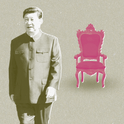Libyan women celebrate Gaddafi’s overthrow. They will not give up freedom easily
The armchair experts on Arab affairs are at it again. Still smarting from not predicting the Arab Spring and in hyping the case for the so-called Islamists who had nothing to do with the recent uprisings, many are now pontificating on what is happening—or going to happen—in Tunisia, Libya and Egypt. “The Arab Spring is becoming an Islamist takeover,” was the pronouncement of Con Coughlin in the Telegraph on 25th October.
Before the election results emerged in Tunisia, we were regaled by reports about widespread voter pessimism, low turnouts, rigged results and conflicts. Instead, we had a record turnout of over 90 per cent and a joyous response from people who had voted, for the first time in their lives, in a free and democratic election. Tunisians, unsurprisingly, have the same concerns as their European counterparts across the Mediterranean: the economy, unemployment and education. Why shouldn’t they?
Undeterred, many of these doom-mongers are now peddling the Islamists-under-the-bed scenario for post-election Tunisia. As an investor in the country, I think that a Nahda-led coalition could provide a strong framework for economic management, and for providing comfort levels for foreign investors. Such was the case for the ruling “Islamic” Justice and Development Party (AKP) in Turkey, which made the economy its priority, and has attracted record foreign investment. And if the Nahda coalition can’t manage the Tunisian economy, it will be the Tunisian electorate that decides whether to keep them in power—on the basis of their track record as managers, not their Islamic piety.
Another mantra of the doubters is the coming erosion of personal freedoms. I, for one, don’t think Tunisian women will accept any party that dramatically curtails their personal freedoms after half a century of rights comparable to their European counterparts. Why should Tunisian women react any differently to Europeans if they felt threatened? And do we really think that Arab electorates everywhere, having fought so hard for their freedom, will accept dictatorship from anyone else?
While the situation is more complicated in Egypt, the same line of argument on the economy will no doubt resonate with the Justice and Freedom party (linked to the Muslim Brotherhood) which faces voters from late November. Egyptians, just like everyone else, will be looking to the politicians they chose for economic solutions—to put money in their pockets—rather than empty rhetoric.
Pundits are browbeating about a Somalian Islamist scenario in Libya, too. “Jihadist plot to take over Libya,” was one headline that appeared in the Washington Times on 4th September; “Libya’s Sharia Law—a different kind of tyranny,” proclaimed the Huffington Post in late October.
It’s widely assumed that, having united to get rid of the dictator, Libyans will revert back to their tribal, not national allegiances. Yet, having lived in Libya during and after liberation, I’ve been struck by the faith and strong moral conviction of this motley people’s army. Roadblocks in all the Libyan cities are manned by Kalashnikov-wielding but card-bearing youngsters. The closest most of these kids have ever got to shooting weapons is in computer games.
What is remarkable is not the transgressions of these revolutionaries—which have occurred and will continue to occur in the absence of a central government—but the fact that the whole place has not descended into anarchy and chaos. It is this strong sense of civitas, underpinned by a deep religious conviction and pent-up frustration with the regime, that has fuelled the revolution in Libya. This is very difficult for a westerner to understand. Can you imagine what would happen if European and US cities were controlled by teenage gunmen? The one good thing that Gaddafi did was to unify Libyans against him.
As with the other fallen Arab dictatorships, it was the inefficient and corrupt management of the economy that drove the people against their leader in Libya. All young people wanted was decent housing, education and medical care—was this so difficult to achieve for such an oil-rich country, and such a small population?
Looking ahead, many commentators are now focusing on the lack of institutions in Libya and the difficulty of building a new state. These are fair concerns, but remember that Libya has been a country since 1951, with a constitution, (my father, Awni Dajani, was one of the members of the constitutional assembly), a functioning supreme court and a parliament—until the 1969 coup by Gaddafi.
So Libya does have a history, and collective awareness as a national entity. But again, it will be the economy rather than the politics or the Islamic credentials that determines the success of the new government.
My message to political “experts” is this: don’t underestimate the peoples of Tunisia, Libya and Egypt—or Syria and Yemen, for that matter. Don’t be too condescending. You might just be pleasantly surprised.
The armchair experts on Arab affairs are at it again. Still smarting from not predicting the Arab Spring and in hyping the case for the so-called Islamists who had nothing to do with the recent uprisings, many are now pontificating on what is happening—or going to happen—in Tunisia, Libya and Egypt. “The Arab Spring is becoming an Islamist takeover,” was the pronouncement of Con Coughlin in the Telegraph on 25th October.
Before the election results emerged in Tunisia, we were regaled by reports about widespread voter pessimism, low turnouts, rigged results and conflicts. Instead, we had a record turnout of over 90 per cent and a joyous response from people who had voted, for the first time in their lives, in a free and democratic election. Tunisians, unsurprisingly, have the same concerns as their European counterparts across the Mediterranean: the economy, unemployment and education. Why shouldn’t they?
Undeterred, many of these doom-mongers are now peddling the Islamists-under-the-bed scenario for post-election Tunisia. As an investor in the country, I think that a Nahda-led coalition could provide a strong framework for economic management, and for providing comfort levels for foreign investors. Such was the case for the ruling “Islamic” Justice and Development Party (AKP) in Turkey, which made the economy its priority, and has attracted record foreign investment. And if the Nahda coalition can’t manage the Tunisian economy, it will be the Tunisian electorate that decides whether to keep them in power—on the basis of their track record as managers, not their Islamic piety.
Another mantra of the doubters is the coming erosion of personal freedoms. I, for one, don’t think Tunisian women will accept any party that dramatically curtails their personal freedoms after half a century of rights comparable to their European counterparts. Why should Tunisian women react any differently to Europeans if they felt threatened? And do we really think that Arab electorates everywhere, having fought so hard for their freedom, will accept dictatorship from anyone else?
While the situation is more complicated in Egypt, the same line of argument on the economy will no doubt resonate with the Justice and Freedom party (linked to the Muslim Brotherhood) which faces voters from late November. Egyptians, just like everyone else, will be looking to the politicians they chose for economic solutions—to put money in their pockets—rather than empty rhetoric.
Pundits are browbeating about a Somalian Islamist scenario in Libya, too. “Jihadist plot to take over Libya,” was one headline that appeared in the Washington Times on 4th September; “Libya’s Sharia Law—a different kind of tyranny,” proclaimed the Huffington Post in late October.
It’s widely assumed that, having united to get rid of the dictator, Libyans will revert back to their tribal, not national allegiances. Yet, having lived in Libya during and after liberation, I’ve been struck by the faith and strong moral conviction of this motley people’s army. Roadblocks in all the Libyan cities are manned by Kalashnikov-wielding but card-bearing youngsters. The closest most of these kids have ever got to shooting weapons is in computer games.
What is remarkable is not the transgressions of these revolutionaries—which have occurred and will continue to occur in the absence of a central government—but the fact that the whole place has not descended into anarchy and chaos. It is this strong sense of civitas, underpinned by a deep religious conviction and pent-up frustration with the regime, that has fuelled the revolution in Libya. This is very difficult for a westerner to understand. Can you imagine what would happen if European and US cities were controlled by teenage gunmen? The one good thing that Gaddafi did was to unify Libyans against him.
As with the other fallen Arab dictatorships, it was the inefficient and corrupt management of the economy that drove the people against their leader in Libya. All young people wanted was decent housing, education and medical care—was this so difficult to achieve for such an oil-rich country, and such a small population?
Looking ahead, many commentators are now focusing on the lack of institutions in Libya and the difficulty of building a new state. These are fair concerns, but remember that Libya has been a country since 1951, with a constitution, (my father, Awni Dajani, was one of the members of the constitutional assembly), a functioning supreme court and a parliament—until the 1969 coup by Gaddafi.
So Libya does have a history, and collective awareness as a national entity. But again, it will be the economy rather than the politics or the Islamic credentials that determines the success of the new government.
My message to political “experts” is this: don’t underestimate the peoples of Tunisia, Libya and Egypt—or Syria and Yemen, for that matter. Don’t be too condescending. You might just be pleasantly surprised.












